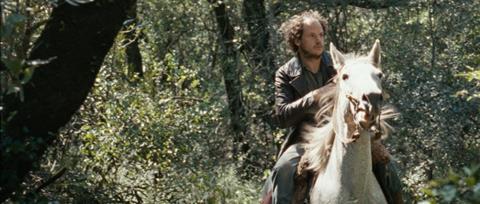Dir/scr: Manuel Nieto Zas. Uruguay-Argentina. 2013. 121mins

After learning of his father’s death in his provincial hometown of Salto, but blissfully unaware of the morass of debts and distrust that will be his sole bequest, spoiled student activist-poseur Ariel Cruz (non-pro Dieste) follows with blank eyes an old man making a beeline across a distant empty plaza and, after boarding a ferry on his lonesome, traversing a narrow channel of water. Clearly an oneiric projection on the part of the son, the lovely if misleading scene is a false microcosm of his dad’s life, an unhindered passage between points A and B that transitions smoothly into the ultimate journey across the River Styx.
Throughout the film, verticality proves an excellent structuring device, a potent contrast to Hernandez-Holz’s gorgeous widescreen cinematography.
The remainder of The Militant (El Lugar del hijo) is a long rude awakening for this oblivious, exceedingly laid back 25-year-old. Nieto (The Dog Pound) systematically demolishes any notion of a level paradigm with a series of nearly insurmountable obstacles that alternate with brief respites. He visually enhances the ups and downs, exaggerating heights and depths to convey a coming-of-age story set in a specific time and place.
Cruz is a Uruguayan whose once-promising legacy has been up-ended by social and economic circumstances beyond his comprehension. By 2002, when the film takes place, this country with a population of only three million that had been considered the “Switzerland of South America” has become as paralysed as the malformed protagonist himself. (Dieste is palsied and stutters as a result of a childhood accident.) This is the period of the economic disaster known as “the Crisis,” its decimation of course claiming bearish neighbour Argentina as well.
Amassing critical plaudits, which already began with multiple awards at the Havana Film Festival, is the best hope for generating interest in this colourful, dry-humoured narrative in which family drama, politics, and social disarray weigh in in equal measure. Typically for films from small Latin American countries, the film tanked upon commercial release domestically, but L.A.-based FiGa Films has found eager markets in other Latin American territories (all rights in Mexico, cable all over the region). The film had no market screenings at festivals, so increased exposure should maximise its crossover potential, especially in Europe. FiGa is planning to self-distribute in the US.
Cruz’s is a default slackerdom. His father had always supported him, so his response when the Notary informs him that his inheritance is comprised of huge debts is unsurprising: “What am I supposed to live off of?” He utters political abstractions at student political meetings back in Montevideo, but he hasn’t a clue about translating concepts into motion, in his own life or in the life of society. In Salto, he briefly joins a meatpacker union’s strike in his search for substance that he’s not getting from the local students, who are mostly interested in party planning. His only gain is a casual girlfriend, Nadia (Courtoisie), but that relationship may turn out to be yet another interruption a succession of major hurdles.
The Militant becomes a cinematic essay on the grasp and the limits of activism. Nieto pokes fun at the students who “occupy” university buildings without understanding the ideological underpinnings of their movement. He also mocks some of the more clownish and sheepish workers on hunger strike against a large slaughterhouse, one that will prove pivotal in the transformation of Cruz. But the director wants it both ways. He pits the activists against such money-grubbers (read capitalists) as the Notary (the late Urdapilleta, playing the part with gusto) and the icy, condescending head of management. The topic remains debatable until the action shifts from town to country, where the balance is upset.
At the prodding of the Notary, the reluctant scion must spend three days at the ranch his father owned in order to round up cattle with local gauchos for immediate sale. The family house in Salto, occupied strangely enough by his dad’s mistress and her relatives (bizarrely unquestioned by Cruz), is now subject to foreclosure. In rural Uruguay, where the practical takes precedence over theory and idealism, and an unspoken meritocracy seeps into the crevices of a feudal system that still holds sway, Cruz encounters a viable if rough form of political engagement. The ranch hands, stiffed by the father for six months wages, gather and brand the animals collectively—the way they are accustomed to. Now, however, clumsy, inexperienced Cruz has inherited the mantle of “boss.” His gross incompetence affects them all, so they not only taunt him, they opt for open rebellion bordering on violence. Masters and servants reverse roles. There’s a pungent whiff of Rules of the Game in these scenes.
Throughout the film, verticality proves an excellent structuring device, a potent contrast to Hernandez-Holz’s gorgeous widescreen cinematography. This South American variation of Upstairs/Downstairs is not set in stone. Today’s hardcore unionist becomes tomorrow’s unbending manager.
To his credit, Nieto does not pretend to have answers. The finale, in which Cruz rides a motorbike in circles, is open-ended. This is an in-progress report on the state of Uruguay.
Production companies: Roken Films, 4L
International sales: FiGa Films, www.figafilms.com
Producers: Andy Kleinman, Lisandro Alonso, Manuel Nieto Zas
Cinematography: Arauco Hernandez-Holz
Editor: Pablo Riera, Martin Mainoli, Manuel Nieto Zas
Production designer: Nohemi Gonzalez, Alejandro Castiglioni
Music: Genuflexos
Main cast: Felipe Dieste, Alejandro Urdapilleta, Rossana Cabrera, Sebastian Blanquer, Carlos Lacuesta, Johnny Rodriguez, Jose Enrique Trinidad, Dana Liseta, German de Silva















![[L-R]: Amanda Villavieja, Laia Casanovas, Yasmina Praderas](https://d1nslcd7m2225b.cloudfront.net/Pictures/274x183/6/4/1/1471641_pxl_20251224_103354743_618426_crop.jpg)





